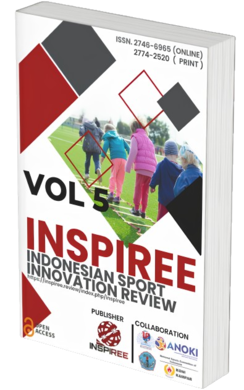
POLICY & INFORMATION
TUTORIAL
INSPIREE: Indonesian Sport Innovation Review is a journal aims to be a leading peer-reviewed platform and an authoritative source of information. We publish original research papers, review articles, and case studies focused on Sport in the world as well as related topics that have neither been published elsewhere in any language nor is it under review for publication anywhere. This following statement clarifies the ethical behavior of all parties involved in the act of publishing an article in this journal, including the author, the editor, the reviewer, and the publisher (INSPIREE & Department of Physical Education and Sport, Universitas Pahlawan) Indonesia. The journal supports the code of conduct set out by the Committee on Publication Ethics (COPE) (https://publicationethics.org/). You can learn much more about the Core Practices on the COPE website: COPE CORE PRACTICES
INSPIREE will adheres to the COPE Code of Conduct for Journal Publishers. We encourage journal editors to follow the COPE Code of Conduct for Journal Editors and to refer reviewers to the COPE Ethical Guidelines for Peer Reviewers as appropriate. Allegations of misconduct will be investigated in accordance with the COPE Best Practice Guidelines as far as is practicable.
Duties of Authors
Duties of Editor
Duties of Reviewers
Change or Modification of Published Paper
Manuscript withdrawal is strongly discouraged, it is waste of valuable resources that publisher put. If author still requests withdrawal of their manuscript, following guidelines has to be followed
Manuscript withdrawal will be permitted only for the most compelling and unavoidable reasons. It is unacceptable to withdraw a manuscript from a journal because it is being accepted by another journal;
Author should submitting a request to editorial office as a letter that signed by all authors stating the full cause that led to the step of manuscript withdrawal;
In a case where a manuscript has taken more than six months time for review process, publishers allows the author to withdraw manuscript without paying any charges;
If the manuscript is still in peer-reviewed process, author have to pay 25.00 ($US) per manuscript as a penalty of withdrawal;
If the manuscript is already accepted for publication, author have to pay 50.00 ($US) per manuscript as a penalty of withdrawal;
If author don't agree to pay the penalty, the author and his/her affiliation will be blacklisted for publication in this journal;
Authors must not assume that their manuscript has been withdrawn until they have received appropriate notification to this effect from the editorial office.
Penalties
Double Submission: If double submission was found or noticed from other sources, editorial board should check the status. If the double submission was confirmed as intentional thing,
• Review process will be terminated.
• The reason should be sent to reviewers, editorial board and authors.
• All authors’ name will be marked as black list, and these authors cannot submit any paper to Journal INSPIREE for two years.
Human-subjects Reasearch
Authors of papers addressing human subjects research must also ensure that the study reported in their submission, as well as the publishing of their manuscript, complies with all applicable regulations in their locality.
Prior to paper submission, authors of manuscripts detailing research involving human subjects must get evaluation and approval (or review and waiver) from their Institutional Review Board (IRB). Authors of multisite research articles must receive permission from each institution's IRB. Upon request, documentation of IRB status must be made accessible. If no institutional review boards or committees exist, the authors must conduct their study in line with the Declaration of Helsinki, as updated in 2013. The Materials and Methods section must include a declaration of IRB approval or waiver (and the explanation for the waiver) or a statement of adherence to the Declaration of Helsinki (or at the end of the text for shorter article types: e.g., announcements, short form papers, etc.).
Informed consent for publication is not needed if the patient cannot be identified from any material in a manuscript. Identifiable characteristics such as patient initials, precise dates, specific geographic exposures, or other identifying elements (including bodily features in figures) should be deleted in the absence of informed permission, but this must not change the scientific meaning. Important information important to the scientific meaning should be expressed in such a way that the patient cannot be recognized, for example, by specifying a season rather than a date or a location rather than a city. If a patient may be recognized from a manuscript's content, every attempt should be taken to get informed consent to publish from patients or their parents/legal guardians if the patient is a minor. In order to give informed consent, the patient must be able to read the manuscript before it is submitted. Either that the patient has examined the entire text or that the patient refuses to do so must be included in the signed consent. The authors should keep a copy of the patient's permission and make it available upon request. The published paper should include a statement attesting to the receipt and preservation of signed patient permission.
For more information, please see the ORI module on human subject research and the COPE guidelines. If the author need help with IRB form, you may email: Irb@inspiree.review

TUTORIAL
| PUBLISHER | COLLABORATIONS |
| Editorial Office: |
| Tuanku Tambusai Street, No. 23 Bangkinang City |
| Kampar Districts, Riau Province, Indonesia, 28412. |
| This work is licensed under a |
| Creative Commons Attribution-ShareAlike 4.0 International License. |
